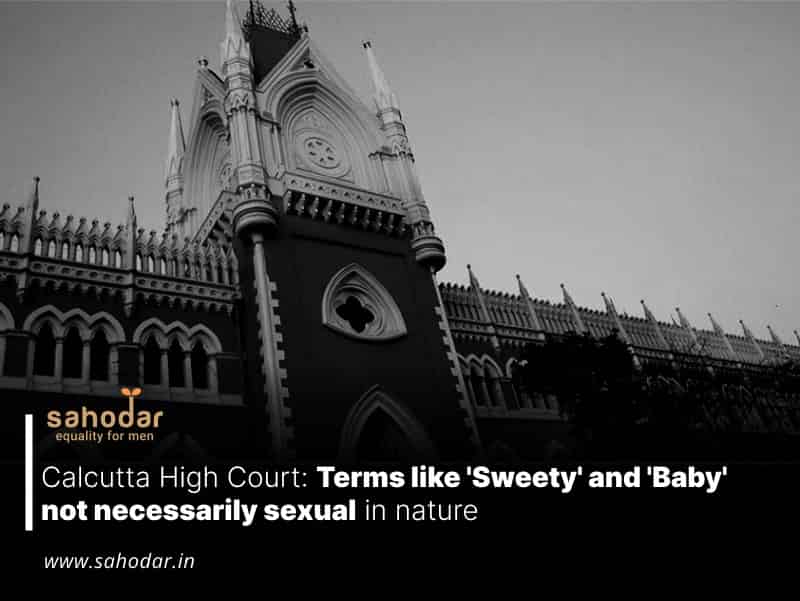The Court also cautioned that if the provisions of the POSH Act are misused, it could create more glass ceilings for women.
The Calcutta High Court recently noted that within certain social circles, terms like ‘Sweety’ and ‘Baby’ are commonly used to address women, emphasizing that their usage doesn’t invariably carry a sexual connotation.
In the same legal ruling, the Court cautioned against potential misuse of the provisions outlined in the Prevention of Sexual Harassment of Woman at Workplace (Prevention, Prohibition and Redressal) Act (POSH Act), suggesting that such misuse could further impede women’s progress by erecting additional barriers.
Justice Sabyasachi Bhattacharyya articulated these views while presiding over a case involving allegations of sexual harassment.
A female employee of the Coast Guard accused her superior of various forms of sexual harassment, including the use of terms like ‘Sweety’ and ‘Baby’ in addressing her.
The accuser argued that these expressions carried underlying sexual implications.
In contrast, the accused officer asserted that he had never intended any sexual connotation with such terms and ceased using them once the complainant voiced her discomfort.
Acknowledging that the Internal Complaints Committee (ICC) deemed such language inappropriate, the High Court underscored that such terms may not necessarily always bear a sexual nature.
“The use of the expressions ‘baby and sweety’ has been held by the Internal Complaints Committee (ICC) itself to be inappropriate. However, it is to be noted that once the petitioner informed the respondent no.7 (alleged offender) about her discomfort in that regard by WhatsApp and otherwise, he never repeated the terms of endearment to address the petitioner. Such expressions may be prevalent in certain social circles and need not always be sexually coloured,” the Court said in the April 24 judgment.
The judge highlighted Section 2(n) of the POSH Act, which delineates ‘Sexual Harassment’ to include sexually suggestive remarks and unwelcome verbal behaviors of a sexual nature.
“Nevertheless, strictly speaking, the employment of the aforementioned expressions (‘Sweety’, ‘Baby’) should not automatically be interpreted as inherently sexual,” the Court elaborated.
Furthermore, the Court took into account that the accused officer ceased using these terms once the complainant raised objections. Consequently, the aspect of “unwelcome” conduct was considered nullified, the Court reasoned.
“Moreover, the verbal use of the words having been once expressed by the petitioner to be unwelcome to her, the respondent never repeated the same, thus taking way the element of ‘unwelcome’ from such verbal use of the words. Thus, although inappropriate, the respondent never repeated the words, which itself shows that those could not have been intended to deliberately irritate the petitioner or to sexually harass the petitioner,” the Court said.Top of Form
In terms of context, the accuser had leveled allegations against her superior officer, claiming instances of sexual harassment, such as inappropriate staring and intruding into her personal space.
However, the Court observed a lack of corroborating witnesses to substantiate these claims. Additionally, due to the delay in filing the complaint, the ICC couldn’t procure any CCTV evidence to validate the accusations, the Court remarked.
“Staring has various shades and does not always necessarily lead to sexual harassment as contemplated in the 2013 Act,” the judge further observed.
The Court remained unconvinced by the claim that the senior officer had employed the phrase ‘hugging the coast’ in a sexual context during the conversation with the complainant. The judge observed that this phrase is commonly used terminology within coast guard circles.
“Such terminology being usual in Coast Guard circles and having been used by the petitioner first, a repeat of the same, even if any, without sexual overtones, as corroborated by witnesses, defeats the allegation itself,” the Court said.
The Court expressed doubts about the authenticity of the allegations due to the timing of the complaint.
The conduct and chronology of events speaks volumes against the petitioner. There were several prior charges against the petitioner by her colleagues across the board. Thus, the possibility of the petitioner using the allegation of sexual harassment as a ruse and afterthought to save her skin from such allegations cannot be ruled out,” the Court observed.
The Court ultimately rejected the writ petition submitted by the complainant and upheld the decision of the ICC to clear the accused senior officer of any misconduct.
The Court highlighted a significant worry: the potential misuse of the POSH Act might inadvertently reinforce barriers for women rather than providing them with the intended protection.
“Since the Statute itself provides sufficient protection (quite rightly so, in view of the harassments often faced by women at their workplaces), a double layer of protection, if extended by adjudicating forums to the complainant, might be counterproductive, since excessive abuse of the provisions of the statute will create more glass ceilings than they remove, creating fetters in the employment of genuinely competent and hard-working female persons,” the judge cautioned.Top of Form
Although the complainant’s writ petition was rejected in this instance, the Court emphasized that its decision did not constitute a judgment on the merits of the criminal case lodged against the accused senior officer, which remains pending.

